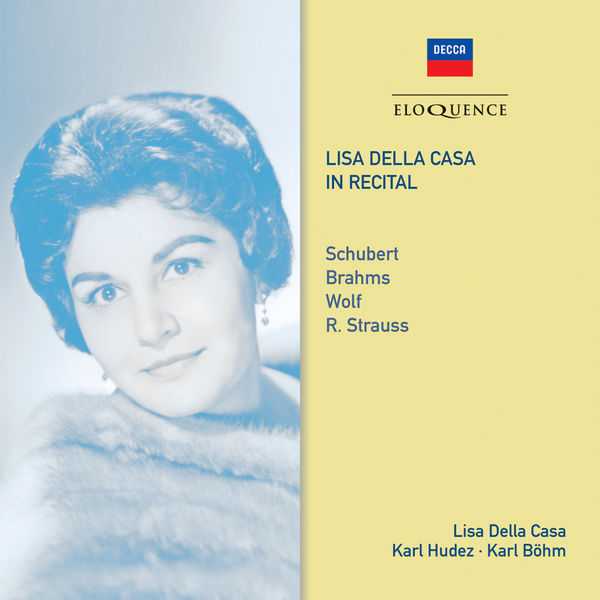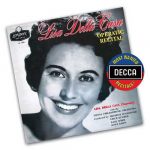
Composer: Johannes Brahms, Franz Peter Schubert, Richard Strauss, Hugo Wolf
Performer: Lisa della Casa, Karl Hudez
Orchestra: Wiener Philharmoniker
Conductor: Karl Böhm
Format: FLAC (tracks)
Label: Decca
Catalogue: ELQ4820276
Release: 2015
Size: 305 MB
Recovery: +3%
Scan: cover
01. Schubert: Auf dem Wasser zu singen, D774
02. Schubert: Im Frühling, D882
03. Schubert: Du bist die Ruh D776 (Rückert)
04. Schubert: Gretchen am Spinnrade, D118
05. Brahms: Wie Melodien zieht es mir, Op. 105 No. 1
06. Brahms: Immer leiser wird mein Schlummer, Op. 105 No. 2
Brahms: Gesänge, Op. 43 Nos. 1-4
07. 1. Von ewiger Liebe
08. Brahms: Ständchen, Op. 106 No. 1
09. Wolf: Der Gärtner (No. 17 from Mörike-Lieder)
10. Wolf: Begegnung (No. 8 from Mörike-Lieder)
11. Wolf: Geh’, Geliebter, geh’ jetzt
12. Wolf: Er ist’s (No. 6 from Mörike-Lieder)
13. Strauss: Einerlei, Op. 69 No. 3
14. Strauss: Ich wollt ein Sträusslein binden, Op. 68 No. 2
15. Strauss: Schlechtes Wetter, Op. 69 No. 5
16. Strauss: Befreit, Op. 39 No. 4
Strauss: Vier letzte Lieder
17. 3. Beim Schlafengehen
18. 2. September
19. 1. Frühling
20. 4. Im Abendrot
That Richard Strauss loved and understood the soprano voice is an inescapable fact. He was married to a soprano, Pauline de Ahna, and thus had a living laboratory for his song-writing. Even after Pauline had retired from the stage, he continued to favour sopranos in his operas and other vocal compositions. And sopranos repaid him with wonderful performances. Lisa Della Casa had only fleeting contacts with Strauss but she inherited the great tradition and after his death, she became the pre-eminent singer of his music in the 1950s and 1960s. She made the first recording of his Four Last Songs and, although many versions have jostled for our attention since then, her achievement has not been surpassed. She had the inestimable advantages of the Vienna Philharmonic and an experienced Strauss interpreter, Karl Böhm, as her partners. She and her conductor also came to the songs without preconceptions: they looked at the music and deduced from Strauss’s markings that it should not be performed too slowly. As a result, they brought a freshness to songs.
A rare recital disc recorded for Decca brings immaculate performances of music by Schubert, Brahms, Wolf and Strauss. Her purity of utterance and lack of sentimentality make for a mesmerising experience. Lisa Della Casa was in some respects a throwback to the pre-war Lieder interpreters, who did not feel the necessity to underline every word and trusted their listeners to use some imagination. We even hear her employ some old-fashioned portamento. But her clarity of enunciation and deep understanding of the German texts are models for younger singers.



